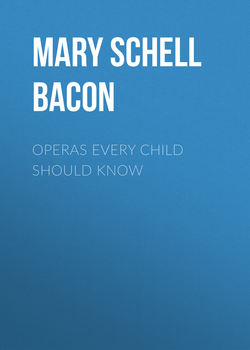Читать книгу Operas Every Child Should Know - Mary Schell Hoke Bacon - Страница 4
BEETHOVEN
ОглавлениеTHE most complete, at the same time picturesque, story of Beethoven and his "Fidelio" is told in "Musical Sketches," by Elise Polko, with all the sentimentality that a German writer can command. Whole paragraphs might be lifted from that book and included in this sketch, but the substance of the story shall be told in a somewhat inferior way.
"Leonora" (Fidelio) was composed some time before it was produced. Ludwig van Beethoven had been urged again and again by his friends to put the opera before the public, but he always refused.
"It shall never be produced till I find the woman in whose powers I have absolute confidence to sing 'Leonora.' She need not be beautiful, change her costume ten times, nor break her throat with roulades: but she must have one thing besides her voice." He would not disclose what special quality he demanded; and when his friends persisted in urging the production of his first, last, and only opera, Beethoven went into a great rage and declared if the subject were ever mentioned again, he would burn the manuscript. At one time friends begged him to hear a new prima donna, Wilhelmina Schröder, the daughter of a great actress, believing that in her he would find his "Leonora."
This enraged him still more. The idea of entrusting his beloved composition to a girl no more than sixteen years old!
His appearance at that time is thus described:
"At the same hour every afternoon a tall man walked alone on the so-called Wasserglacis (Vienna). Every one reverentially avoided him. Neither heat nor cold made him hasten his steps; no passer-by arrested his eye; he strode slowly, firmly and proudly along, with glance bent downward, and with hands clasped behind his back. You felt that he was some extraordinary being, and that the might of genius encircled this majestic head with its glory. Gray hair grew thickly around his magnificent brow, but he noticed not the spring breeze that played sportively among it and pushed it in his eyes. Every child knew: 'that is Ludwig van Beethoven, who has composed such wondrously beautiful music.'"
One day, during one of these outings a fearful storm arose, and he noticed a beautiful young woman, whom he had frequently seen in his walks, frightened but standing still without protection from the weather. She stared at him with such peculiar devotion and entreaty that he stopped and asked her what she did there in the storm.
She had the appearance of a child, and great simplicity of manner. She told him she waited to see him. He, being surprised at this, questioned her, and she declared she was Wilhelmina Schröder, who longed for nothing but to sing his Leonora, of which all Vienna had heard. He took her to his home, she sang the part for him, and at once he accepted her.
It was she who first sang "Fidelio," and she who had the "quality" that Beethoven demanded: the quality of kindness. It is said that her face was instinct with gentleness and her voice exquisitely beautiful. It was almost the last thing that Beethoven heard. His deafness was already upon him, but he heard her voice; heard his beloved opera sung, and was so much overcome by the beauty of the young girl's art that during the performance he fainted.
Of all temperamental men, Beethoven was doubtless the most so, and the anecdotes written of him are many. He was especially irascible. His domestic annoyances are revealed freely in his diary: "Nancy is too uneducated for a housekeeper – indeed, quite a beast." "My precious servants were occupied from seven o'clock till ten, trying to light a fire." "The cook's off again – I shied half a dozen books at her head." "No soup to-day, no beef, no eggs. Got something from the inn at last." These situations are amusing to read about, decades later, but doubtless tragic enough at the time to the great composer!
That in financial matters Beethoven was quite practical was illustrated by his answer to the Prussian Ambassador at Vienna, who offered to the musician the choice of the glory of having some order bestowed upon him or fifty ducats. Beethoven took the ducats.
Beautiful as the production of "Fidelio" was, it did not escape criticism from an eminent source. Cherubini was present at the first performance at the Karnthnerthor Theatre in Vienna, and when asked how he liked the overture (Leonora in C) he replied:
"To be honest, I must confess that I could not tell what key it was in from beginning to end."
